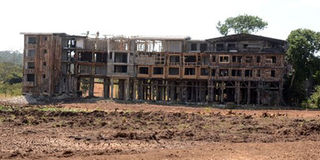Queen’s getaway in search of lost glory

PHOTO/JOSEPH KANYI
The Treetops hotel in Nyeri which is undergoing a facelift. The hotel is renowned as the place where then Princess Elizabeth first heard the news of her father’s death and that she was to be Queen.
Treetops Hotel in Nyeri may have lost its sheen now, but it was definitely the place to be in 1952.
It is here that the then Princess Elizabeth first heard the news that her father had died and that she was to be Queen.
Monday marked the 60th commemoration of the coronation of Queen Elizabeth II, but there were no celebrations at the Treetops Lodge.
The hotel, which was closed on October 1 last year for renovation, has attracted numerous other dignitaries in and out of the country. They include former Presidents Daniel arap Moi and Kenneth Kaunda of Zambia.
Prince Edward was in the hotel in 2002 during the 50th commemoration of the Queen’s ascension to the throne while representing her.
Wedding present
According to author Nicholas Best writing in the Guardian (January 8), while the princess was at Treetops on the night her father, George VI, died 60 years ago on February 6, 1952, she was not told until the following afternoon, by which time she had returned to a fishing lodge in Sagana, which she had been given as a wedding present.
It was there, beside a trout stream in the foothills of Mt Kenya, that Prince Philip broke the news, writes Best.
She came to the country on invitation of Eric Sherbrooke Walker, a hotelier and the founder of Treetops Hotel located inside the Aberdare National park.
There would have been celebrations in the hotel on Monday but it will have to wait a little longer as it is undergoes renovation.
“If it was open we would have held celebrations in honour of the Queen. This being a jubilee year we are having plans to do something as the year progresses,” said Aberdare Safari Hotels marketing manager Elizabeth Nguraru.
Previously built on wooden stilts, which are now being replaced by concrete ones, the hotel boasts of international and local clientele visiting the park.
It formerly had 50 rooms which have been reduced to 36 self-contained rooms, a move from twin rooms which lacked bathrooms.
In the current renovation, there is a mixture of concrete and tree barks to maintain its originality.
“We want it to have its originality while offering our clients luxurious services. All the suites will have bathrooms. We want to appeal to the local and international clients,” says Ms Nguraru.
The renovation will cost about Sh120 million, according to the marketing manager.
It was a beehive of activities on Monday as workers were busy on the new-look hotel trying to beat the April deadline when it will be unveiled.
Three out of the 36 will be standard ensuites while three others will be bigger to accommodate a variety of clients depending on their tastes.
One of the suites will be named ‘Queen Elizabeth’s Suite’ in commemoration of the 1952 event.
The first two-roomed house was built in 1932 on top of a fig tree. The current structure entirely sits on stilts.
In 1954, it was burnt down by Mau Mau fighters, only two years after the Queen visited but reconstructed again in 1956.
New experience
It was refurbished the last time in 1996 and its glamour was long overdue, according to Ms Nguraru.
“When the hotel is opened come April 1, guests will have a new experience,” she says.
Its location in the wild and connection with the royal family have had a multiplier effect on tourism in Kenya as it has become a tourist destination.
At the natural spring, which attracts numerous wild animals and birds, a water hole has been dug.
It will be fed with water from a nearby dam when water levels go down during dry spells.
“The animal viewing decks have been maintained in the new structure and suite windows are bigger so that guests can view animals while in their rooms,” Ms Nguraru explains.
She says the hotel management will tap into the Easter holiday celebrations to not only market the hotel as it is bound to attract numerous international and local visitors.
“We are going to capitalise on online marketing and operators and travel agents to market it to the international community,” she explains Ms Nguraru.





